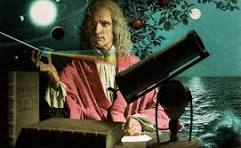|
|
|

ISAAC NEWTON: ONE OF THE WORLDS SCIENTIFIC GIANTS  | Simo Jelača | |
| |
detail from: KRK Art dizajn
ONE OF THE WORLD'S SCIENTIFIC GIANTSISAAC NEWTON
Dr. Simo Jelača
Isaac Newton, (1643-1727) creator of Universal Gravitation, attractive forces of planetary bodies in the solar system, outstanding mathematician, university professor, president of the Royal Society of England, who was declared a Lord for his scientific achievements.With universal gravitation, Newton formulated the mutually attractive forces of the planets in the solar system, which are proportional to their masses, and inversely proportional to the square of their distances. Expressed in the form of a formula, it looks like:F = M x m / r2
At the same time, Newton predicted that there should be a constant in the given formula, which is proportional to the masses of the given bodies, but he did not determine it. After him, it was calculated by Henry Cavendish (1798), the value of 6.6742 x 10-11Newton's universal gravity is extremely precise and is used by all astronomers in the world, who very accurately calculate the positions of all planets and other celestial bodies in the solar system at any desired moment.Isaac Newton was born on December 25, 1642, according to the Julian calendar, which was then valid in England, which corresponded to January 4, 1643, according to the Gregorian calendar. He was born prematurely, and his father died three months before his birth. As his mother remarried, Isak did not get along with his stepfather, so he grew up with his grandmother. At the school in Grantham, he studied Latin and ancient Greek. He received his higher education at Trinity College, Cambridge University.In England, he was accepted, above all, as an outstanding mathematician. He dealt with mathematics in all disciplines of his scientific research. In addition, he is recognized as a physicist, astronomer, alchemist and as a scientist who described his time as philosophical. Isaac Newton is, without a doubt, certainly one of the key scientific figures of the world.During his working career, Newton was a member of the Parliament of Cambridge University and its president, and he was also the president of the Royal Society. He taught mathematics at Cambridge University. As a famous mathematician, he published a book during his lifetime; "Philosophia Naturalis Principia Mathematica", in Latin in 1687. Scholars usually call that book "Principia" for short. In that book, Newton formulated the laws of natural movements in the universe, as Universal Gravitation, which established the dominant scientific view for centuries ahead. His mathematical description of gravity provided the basis for Kepler's laws of motion of the planets and comets, with remarkable accuracy, with the sun at the center. He also determined the movements of the earth and the moon in the solar system and confirmed that the shape of the earth is spherical, which was later confirmed by many scientists.Newton also made the first practical telescope, based on the principle of refracting mirrors, instead of prisms, and through a glass prism he obtained the color spectrum of sunlight. In that domain, he published the famous book "Optics" in 1704. He also taught optics as a subject at the university.The scientific world accepted Newton as a great man who improved all areas of mathematics, and Cambridge University rated him as a genius. While studying optics, Newton defined sunlight as corpuscular material, stating that sunlight consists of particles (corpuscles). However, among all the achievements that Newton achieved, I think that his greatest contribution to the science of mankind is his Universal Gravitation. He created the heliocentric solar system in 1680, which confirmed that the solar system is not always in the same place. And the sun travels, along with its entire system of planets. He was also elected a member of the French Academy of Sciences, and in 1717 he was declared a Lord. Mathematician Joseph-Louis Lagrange said that Newton was the greatest genius who ever lived.A lot has been written about Newton in the world, so my intention is not to repeat it, I just wanted to remind the readers of the Literary Workshop, who want it, of a scientific giant worth remembering.

|

















